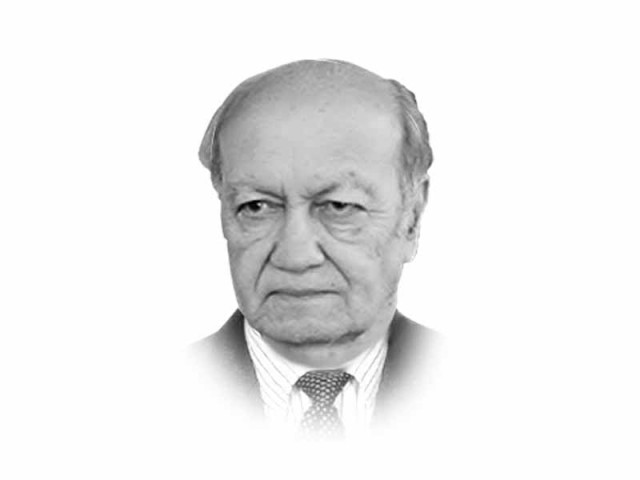Turmoil in the Middle East and its implications
The US and Russia are supporting opposing camps, while extending limited cooperation where interests converge

The writer is a retired lieutenant general of the Pakistan Army and a former federal secretary. He has also served as chairman of the Pakistan Ordnance Factories Board
The resolution of the nuclear issue has immensely helped Iran reassert itself. The lifting of debilitating sanctions, release of blocked $100 billion from US banks, accompanied by a reinvigorated relation with the West and prospects of foreign investment could lead to the reversal of Iranian fortunes for the better. It could emerge as a major regional power that has the ability to influence events and shape a new geo-political order in the Middle East.
Large parts of Syria, Iraq and Libya are ungoverned territory and the intensity and expanse of civil war indicates these countries will remain in a state of acute instability for years. Change will only occur if new power centres emerge that are able to work out a peaceful settlement based on equitable sharing of power and building a new political order. The power vacuum created by the loss of state authority and unstable civil society has led to the emergence of Da’ish and other militant groups. What path these forces would take in future remains unclear.
The Americans have accepted Russia’s role in Syria as a quid pro quo for its contribution in putting pressure on Iran to settle for the truncated nuclear programme.
Already, we find Libya in deep disarray and in state of civil war, with Da’ish making significant inroads. According to UN estimates, there are about 6,500 IS fighters in Libya and their numbers are fast growing. They have carried out high-profile attacks in all major cities and done great damage to oil installations. Boko Haram fighters are in league with the IS, which adds to the complexity of the problem, with serious implications for the region.
Terrorist groups, especially in the Middle East, have become more organised, better trained and equipped, technology savvy and very threatening. They have flourished in most of these countries because population is disgruntled and disempowered.
Turkey, economically and militarily, the most powerful Muslim country, has a key role in stabilising the region. But for that it has to rise above partisan policies. Prior to President Recep Tayyip Erdogan, the Turkish military had a dominant influence in politics and took pride in its secularism. Erdogan is now promoting Turkey’s strong Muslim identity while retaining its democratic structure for gaining popular support and legitimacy. He is steering a major political transition that could bring about an ideological transformation in the power structure of Turkey. He is akin to a modern version of a Khalifa. Is Erdogan setting a model for other Muslim countries by innovating a merger of democracy with Islamic values or merely using religion to tighten his grip? Of course, his detractors would like to believe it is the latter. But his broad-based support, especially among the less affluent, is a source of great strength and allows him the space to carry out reforms of his choosing. Moreover, the remarkable economic growth that has taken place during his tenure goes to his credit. One hopes that the upheaval in the region and Turkey’s involvement in Syria and confrontation with Kurds will not reduce these gains.
Saudi Arabia is fast losing its strategic clout as oil prices drop in the international market. With the lifting of international sanctions, Iran poses a serious challenge to Saudi’s dominance in the Middle East. It is ironic, but not surprising, that Saudi Arabia is realigning itself with Israel in order to balance Iran’s growing strategic power. The consequence of it is further neglect of the Palestinian cause by Arab regimes.
Saudi’s future appears to be in a flux. Prince Mohammad who has internally sidelined his more competent nephew Mohammed bin Nayef, has assumed greater control over the Kingdom. Saudi King Salman’s health is in poor condition and Prince Mohammad is the defacto ruler. He has changed the very dynamics of how power is exercised and configured. Pursuing an aggressive foreign policy with hardly any experience in managing foreign relations, it is not clear how the young prince will steer the country. His adventure in Yemen has been a disaster, siphoning away enormous wealth and resources at a time when circumstances demanded austerity and caution. If he had diverted the same funds to Yemen’s economic development, things could have been different. Saudi Arabia needs to concentrate more on resolving internal challenges rather than focusing on the external front.
Israel, finding the Muslim world victim of internal and external divisions and free from the Syrian threat, is focusing on the Sinai theatre. It is here that the IS is digging in its heels and poses a serious security challenge for Egypt. Israel, by moving significant forces from Syria to Sinai, poses an additional security threat. With people alienated after military takeover and Egyptian President Abdel Fatah el-Sisi’s legitimacy questioned by his opponents, Egypt faces an uncertain future. Moreover, it is financially in deep trouble as its tourism has suffered due to the deteriorating security situation and is leaning heavily on Saudi Arabia for financial assistance — despite major differences on policy issues, especially with regard to Saudi’s war in Yemen and its developing proximity with Israel.
Islamabad must maintain strong strategic and political relations with Saudi Arabia while maintaining a balance and closeness with Iran. Opting to a play a constructive role in regional stability would require deft handling and clarity of purpose.
Published in The Express Tribune, March 9th, 2016.
Like Opinion & Editorial on Facebook, follow @ETOpEd on Twitter to receive all updates on all our daily pieces.














COMMENTS
Comments are moderated and generally will be posted if they are on-topic and not abusive.
For more information, please see our Comments FAQ